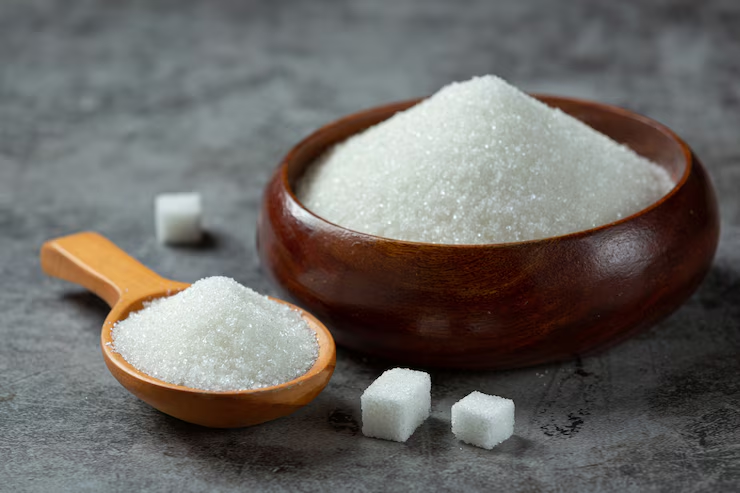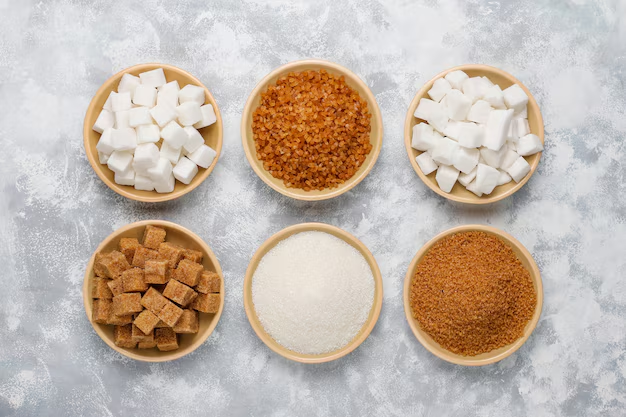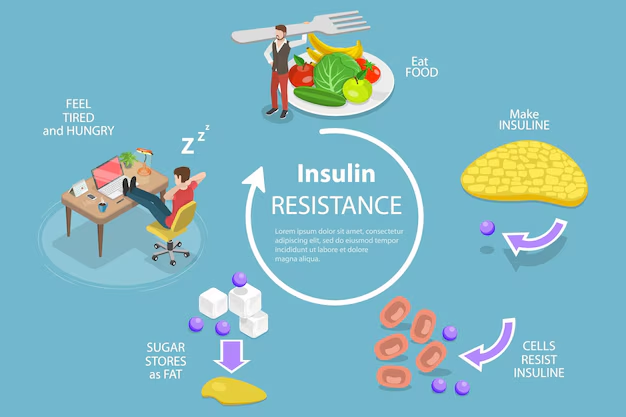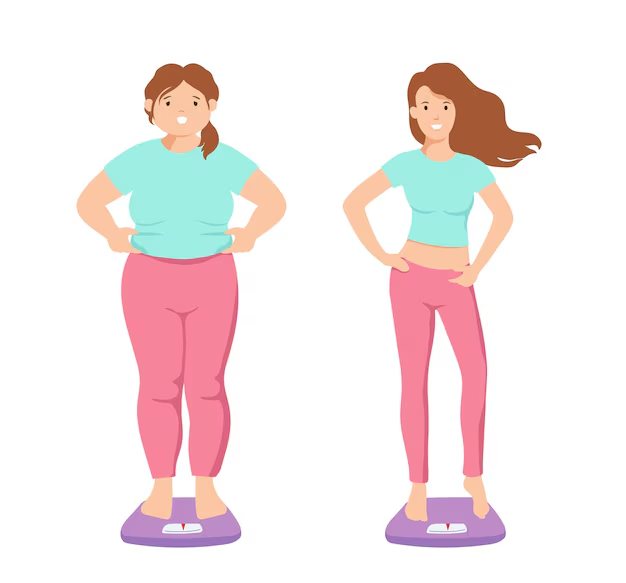Sugar is a common ingredient in many processed foods, often hidden in items we don’t expect, like sauces and packaged snacks. It’s become a regular part of our daily diets, from our morning coffee to occasional desserts. While it may seem harmless, sugar’s effects on the body—especially in relation to weight loss—are more complex than we often realize.
Sugar impacts metabolism by encouraging the storage of fat in the body. It also disrupts insulin function, leading to insulin resistance, which makes it harder for your body to burn fat. Additionally, sugar can interfere with hunger cues, causing you to feel hungrier and eat more than necessary. These factors can contribute to weight gain and make losing weight more challenging.
Reducing sugar intake is crucial for better health and achieving weight loss goals. It doesn’t mean depriving yourself, but rather making mindful choices to lower your sugar consumption. This can be done by swapping sugary snacks for healthier alternatives and being aware of hidden sugars in foods.
What Is Sugar ?

Before we explore how sugar impacts weight loss, it’s important to first understand what sugar is and how it works in the body. At its core, sugar is a simple carbohydrate. When you consume sugar, your body breaks it down into two key components: glucose and fructose. These are then used by cells for energy, fueling various bodily functions.
There are two main types of sugar you’ll encounter in your diet:
Glucose: Glucose is the body’s primary source of energy. It is used by every cell in the body and is absorbed directly into the bloodstream when you consume carbohydrates. Once in the bloodstream, glucose either gets used immediately for energy or is stored in the liver and muscles as glycogen for future use.
Fructose: Fructose, on the other hand, is primarily found in fruits and is metabolized differently from glucose. It’s processed mainly in the liver, where it can be converted into fat if consumed in large amounts.
While glucose is essential for energy, fructose—especially when consumed in excess—can contribute to negative health effects like fat storage and metabolic problems. The issue, however, doesn’t just come from the natural sugars found in whole foods like fruits. The real concern is with added sugars—the refined sugars and syrups that are added to processed foods, which can have much more significant consequences for health when consumed in large quantities.
The Different Types of Sugar
Not all sugars are the same. Natural sugars are found in whole foods like fruits and dairy, while added sugars are those introduced during processing or preparation, such as in sugary drinks, snacks, and desserts. Added sugars can have more significant health impacts, contributing to weight gain and other issues.
Natural Sugars
Natural sugars are found in whole foods like fruits, vegetables, and dairy. The important difference is that these sugars come with beneficial nutrients such as fiber, vitamins, and minerals. These nutrients help slow down sugar digestion, preventing rapid spikes in blood sugar. For instance, the sugar in an apple is processed more slowly by the body, thanks to its fiber content, compared to the sugar in a sugary soda, which is absorbed quickly and can cause sudden increases in blood sugar levels. This makes natural sugars easier for the body to handle.
Added Sugars
Added sugars refer to sugars or syrups that are incorporated into food during processing or preparation. These sugars are not naturally occurring in the food but are added to enhance flavor, texture, or preserve the product. Common examples include sweeteners found in soft drinks, snacks, baked goods, and packaged desserts, often contributing to excess calorie intake. Common sources include:

Table sugar (sucrose)
High-fructose corn syrup (HFCS)
Agave syrup
Honey
Unlike natural sugars, which are found in whole foods like fruits, vegetables, and dairy, added sugars provide what are known as empty calories. This means they increase your daily calorie intake without offering any essential nutrients such as vitamins, minerals, or fiber. Foods containing added sugars typically lack the nutritional value that comes with naturally occurring sugars, which are packaged with helpful nutrients.
Natural sugars, when consumed in moderation, are not harmful and can actually be beneficial, as they are part of a whole, nutrient-rich food. However, the problem arises when added sugars are consumed in excess. Overloading your diet with added sugars can lead to a variety of health issues, such as weight gain, insulin resistance, and increased risk of chronic conditions like heart disease and type 2 diabetes. This excessive intake of added sugars can also make it more difficult to achieve your weight loss goals, as they contribute to higher calorie consumption without providing any lasting energy or nutritional benefits.
Sugar and Its Impact on Metabolism
When you eat sugar, it quickly enters your bloodstream, causing your blood sugar levels to rise. To manage this sudden increase, your pancreas releases a hormone called insulin. Insulin plays a key role in helping control blood sugar levels by moving glucose from your blood into your body’s cells. Once inside the cells, glucose can either be used right away as a source of energy or stored for future use, usually in the liver or muscles. This process helps keep your blood sugar levels within a healthy range. However, when you eat too much sugar too often, your body must release insulin more frequently, which can strain this system and lead to further health issues over time if not managed properly.
However, when you consume sugar often, especially large amounts of added sugar, this natural process can start to cause problems. Here’s what happens:
The Insulin Response
Every time you eat sugar, your pancreas releases insulin to help manage your blood sugar levels. Insulin acts as a “storage hormone,” telling your body to store any extra glucose as fat. If you regularly consume more sugar than your body can use for energy, your pancreas must work harder and release more insulin. Over time, this constant strain can lead to problems with fat storage and overall health.
Insulin Resistance
When this cycle continues for a long time, your body can become less sensitive to insulin, leading to a condition called insulin resistance. In simple words, your cells stop responding properly to insulin’s signal to absorb glucose. As a result, glucose remains in your bloodstream for longer periods, and your body stores more fat. This makes it much harder for people with high sugar intake to lose weight. Insulin resistance is a major cause of weight gain, especially around the belly area. It not only affects weight loss but also increases the risk of developing type 2 diabetes, a serious health problem.
How Sugar Affects Your Hunger and Cravings
Have you ever eaten a sweet snack and felt hungry again just an hour later? This happens because sugar has a strong effect on your hunger and cravings. Here’s what’s going on:
Blood Sugar Spikes and Crashes
When you eat foods high in sugar, your blood glucose levels rise very quickly, giving you a short burst of energy. However, this spike is soon followed by a sudden and sharp drop in blood sugar levels. This “crash” often leaves you feeling tired, irritable, and even hungrier than before. In response, your body naturally craves more quick energy sources like sugary foods, leading to a repeated cycle of overeating and constant cravings. Over time, this can make it difficult to control your appetite and maintain healthy eating habits.
Dopamine and the Reward System
Eating sugar also triggers the release of dopamine in the brain, a chemical responsible for feelings of pleasure and reward. This makes sugary foods especially tempting, creating a temporary sense of happiness and satisfaction. Even if you are not physically hungry, you may find yourself reaching for sugary snacks simply to feel good. Over time, this pattern can lead to emotional eating, where sugar becomes a way to cope with feelings of stress, sadness, or boredom, rather than true physical hunger.
The Link Between Sugar and Insulin Resistance
As mentioned earlier, insulin is the hormone responsible for controlling blood sugar levels. However, when you regularly consume too much sugar, your body’s cells can start to ignore insulin’s signals, leading to a condition called insulin resistance.
What Is Insulin Resistance ?
Insulin resistance happens when the body’s cells stop responding properly to insulin, the hormone that helps move glucose from the blood into the cells for energy. Normally, when you eat, your blood sugar rises, and insulin helps bring it back down by allowing glucose to enter your cells. But with insulin resistance, the cells don’t respond as they should. As a result, glucose stays in the bloodstream, leading to higher blood sugar levels.

To fix this, the body produces even more insulin to try to get the cells to respond. Over time, this puts a strain on the pancreas, which can eventually lead to serious health problems, including type 2 diabetes. Insulin resistance is often linked to weight gain, especially around the belly area, and can also increase the risk of heart disease. Lifestyle factors like a diet high in sugar, lack of exercise, and being overweight all contribute to insulin resistance. Managing your diet and staying active are key ways to prevent or improve this condition.
Increased fat storage: Elevated insulin levels promote fat storage, especially around the abdominal area.
Increased hunger and cravings: Insulin resistance often leads to cravings for high-carb, sugary foods, making it difficult to maintain a healthy diet.
Weight gain: Insulin resistance is a major contributor to weight gain and difficulty losing weight.
One of the best ways to improve insulin sensitivity and reverse insulin resistance is by cutting back on sugar. By stabilizing blood sugar levels, your body will be better equipped to burn fat and maintain healthy energy levels.
Sugar’s Effect on Fat Storage
Consuming too much sugar, especially fructose, can lead to increased fat storage in the body, particularly in the liver and around the belly. Fructose, commonly found in sugary foods and drinks, is processed differently by the body and tends to be stored as fat more easily. This can contribute to weight gain, especially in the abdominal area.
Fructose and Fat Storage
Fructose is processed by the liver, where it can be converted into fat. When consumed in large amounts, fructose overwhelms the liver, leading to fat storage and potentially causing non-alcoholic fatty liver disease (NAFLD). This condition involves fat buildup in the liver without excessive alcohol consumption, impairing liver function and disrupting metabolism.
Additionally, fructose doesn’t trigger insulin release as strongly as glucose does. As a result, your body doesn’t receive the usual signal to stop eating, making it easier to overeat and gain more weight. This lack of satiety can cause you to consume more calories, particularly from sugar-laden foods.
The combination of insulin resistance and excess fat storage, particularly in the liver and abdominal area, makes it extremely difficult to lose weight when consuming too much sugar. Over time, these factors contribute to weight gain and metabolic issues, complicating efforts to achieve and maintain a healthy weight.
The Emotional Rollercoaster: Sugar and Mood Swings
Excess sugar consumption doesn’t just affect your waistline—it can also impact your mood. Studies show that sugar can lead to irritability, fatigue, and anxiety, creating emotional ups and downs that can negatively affect your overall well-being.
Blood Sugar Fluctuations and Mood

As mentioned earlier, consuming sugar causes rapid spikes in blood sugar levels, followed by sharp crashes. These fluctuations can significantly impact your mood. The crash in blood sugar often leaves you feeling drained, irritable, and mentally foggy, which can make it harder to concentrate or stay positive. To cope with these feelings, many people instinctively reach for more sugar, creating a cycle where the body continuously craves sugary foods to restore energy and improve mood. This can lead to sugar dependency over time.
Moreover, sugar intake can affect the balance of neurotransmitters in the brain, such as serotonin, which plays a key role in regulating mood. This imbalance can contribute to feelings of anxiety and even depression. While sugar may provide a temporary sense of pleasure and satisfaction, it’s often short-lived. Once the effects wear off, the feelings of fatigue, irritability, and low mood return, which can push people to seek more sugar, reinforcing the cycle.
The Hidden Sugars in Your Diet
Reducing sugar intake can be challenging because it’s often hidden in foods that don’t taste sweet. Common sources include condiments, sauces, processed meats, salad dressings, and even bread, making it important to carefully read labels and be mindful of hidden sugars.
Salad dressings
Bread and pasta sauces
Yogurt (especially flavoured varieties)
Granola bars
Condiments like ketchup and BBQ sauce
It’s important to watch for added sugars in packaged foods. By checking the ingredients label, you can identify hidden sugars, which may appear under names like “high-fructose corn syrup,” “corn syrup,” “agave nectar,” and “honey.”
How to Reduce Sugar for Better Weight Loss
The good news is that cutting back on sugar can enhance your health, support better weight management, and provide more consistent energy throughout the day, helping you feel better overall and maintain balanced energy levels. Here are a few strategies to help you cut back on sugar:
Cut out sugary drinks: Beverages like sodas, fruit juices, and energy drinks are high in sugar and provide little nutritional value. Instead, choose water, herbal teas, or sparkling water with a splash of lemon for flavor. These options will keep you hydrated without the added sugar that can spike your blood sugar levels.

Read labels: Always take the time to check food labels for added sugars. Look for hidden sources of sugar that may be included in ingredients like sauces, dressings, processed snacks, and even some breads. Understanding how much sugar is in your food helps you make healthier choices.
Eat whole foods: Focus on eating whole, nutrient-dense foods such as fruits, vegetables, lean proteins, and healthy fats. These foods are naturally low in added sugars and provide essential nutrients that support overall health, making it easier to maintain balanced blood sugar levels.
Opt for natural sweeteners: If you need something sweet, consider using natural sweeteners like stevia or monk fruit. These alternatives have a minimal impact on blood sugar, helping you satisfy your sweet cravings without disrupting your metabolism.
Gradually reduce sugar intake: Slowly cutting back on sugar can help reduce cravings without making you feel deprived. This gradual approach allows your body to adjust over time, making it easier to stick to a lower-sugar lifestyle while still enjoying the foods you love.
Sugar Substitutes: Are They a Better Option?
Many people turn to sugar substitutes like stevia, monk fruit, and erythritol to satisfy their sweet cravings without the added calories. These natural alternatives are a better choice than refined sugars, as they have little impact on blood sugar levels and are generally considered safe. However, it’s still important to use them in moderation, as excessive consumption can have unintended effects.
On the other hand, artificial sweeteners like aspartame or sucralose should be consumed with caution. Some studies suggest they may disrupt the gut microbiome and could lead to increased cravings for sweet foods, making it harder to reduce sugar intake. Opting for natural, minimally processed sweeteners is a healthier option for those looking to cut back on sugar while still enjoying sweetness.
Conclusion

Reducing sugar intake can have a significant impact on your weight loss goals and overall health, even if cutting it out entirely isn’t necessary. Understanding how sugar affects your metabolism, insulin resistance, fat storage, and cravings is key to making more informed food choices. When you manage sugar consumption, you can better regulate your body’s processes and prevent weight gain associated with excessive sugar.
Achieving weight loss requires making long-term changes to your eating habits, and this doesn’t mean deprivation. By finding a balance and focusing on reducing sugar, you can enjoy your meals while supporting your weight loss journey. It’s important to prioritize whole, nutrient-dense foods to fuel your body.
By adopting healthier eating habits and lowering sugar intake, you can improve your health, boost energy levels, and feel better overall. A balanced diet will not only help you shed excess weight but also enhance your well-being in the long run.
FAQs
- How does sugar contribute to weight gain?
Sugar spikes blood sugar, causing the body to release insulin, which promotes fat storage. Over time, high sugar intake leads to insulin resistance, making weight loss harder and encouraging fat buildup, especially around the belly. - Is it better to cut out sugar completely for weight loss?
Completely cutting sugar isn’t necessary. Focus on reducing added sugars in processed foods and sugary drinks, but natural sugars from fruits and veggies are fine in moderation. - What are the long-term effects of consuming too much sugar?
Excess sugar can lead to obesity, insulin resistance, type 2 diabetes, heart disease, and fatty liver disease over time. - Can eating sugar in the morning affect my weight loss efforts?
Yes, eating sugar in the morning can cause blood sugar spikes and crashes, leading to increased hunger and overeating later. A protein-rich breakfast is a better choice. - Can I still eat desserts while trying to lose weight ?
Yes, you can! Just be mindful of portion sizes and swap out refined sugar for healthier alternatives like stevia or monk fruit. Small, occasional treats can fit into a balanced diet.


